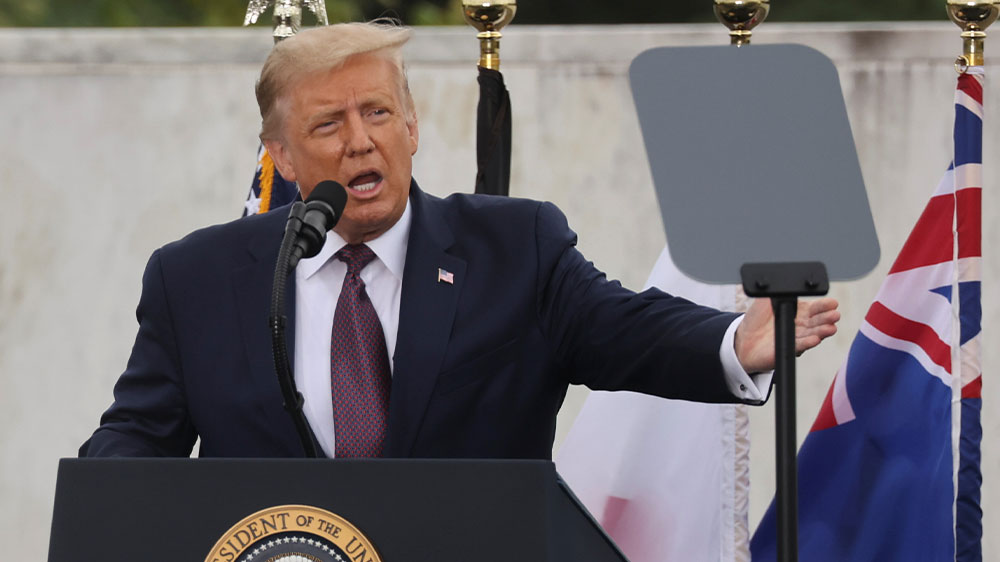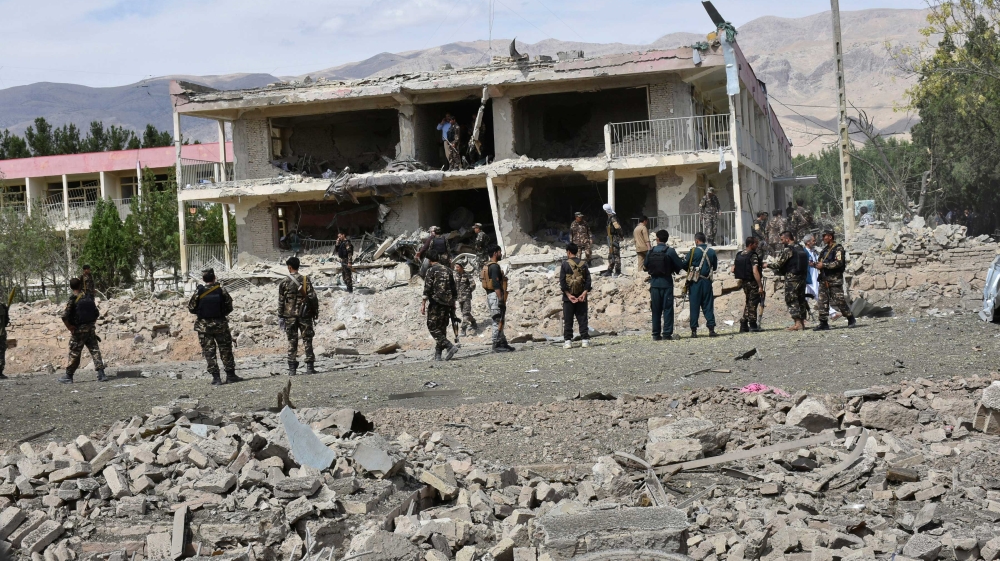As the United States marks the 19th anniversary of the deadliest attack on American soil, President Donald Trump seeks to fulfil his pledge to end the country’s post-9/11 “forever wars”, drawing down troops in Iraq and Afghanistan.
The troop withdrawals come as the US-supported government of Afghanistan prepares to begin talks with the Taliban on Saturday aimed at bringing an end to almost two decades of bloodshed that followed the al-Qaeda attacks on the US on September 11, 2001.
The US invaded Afghanistan and drove the Taliban from power in retaliation for the September 11 attacks, which had been planned while al-Qaeda’s leader, Osama bin Laden, was living in the country under Taliban protection.
Nearly 20 years of war in both countries has led to the deaths and injuries of an estimated 300,000 Iraqi and Afghan people, according to the United Nations Mission in Afghanistan, and Iraq Body Count.
The Congressional Research Service reported in June that the US had suffered approximately 2,400 military fatalities in Afghanistan, and that US Congress had appropriated some $137bn for the country’s reconstruction since 2001.
Marine General Frank McKenzie, commander of US Central Command (Centcom), announced on Wednesday that troop numbers in Iraq will be cut to about 3,000, from roughly 5,200.
The decision was a “clear demonstration of our continued commitment” to enabling Iraqi forces to secure the country “without external assistance”, McKenzie said.
The US invaded Iraq in 2003, ostensibly to put an end to an alleged weapons of mass destruction programme, removed the governing infrastructure of dictator Saddam Hussein, and left an occupying force in the country until 2011. In 2014, American troops were re-deployed to Iraq as the ISIL (ISIS) armed group overran large parts of the country.
Troop numbers in Afghanistan are also coming down.
“We’re on a glide slope to be at 4,500 by the November timeframe – October, late October, November timeframe”, McKenzie said, according to Centcom officials.
Democratic presidential nominee Joe Biden said he supports President Donald Trump’s push to withdraw US troops from Iraq and Afghanistan, though not completely.
“These ‘forever wars’ have to end. I support drawing down the troops,” Biden told the newspaper Stars and Stripes. “But here’s the problem, we still have to worry about terrorism and [ISIL].”
“I think we need special ops capacity to coordinate with our allies,” Biden said, adding that a maximum of “1,500 to 2,000” soldiers should remain.
The cuts in Afghanistan are part of the conditional deal the US struck with the Taliban, signed in Doha – where the group has a political office – on February 29, to reduce troops to zero by May next year. There are now 8,600 US soldiers in Afghanistan, down from about 13,000 before the agreement.
The talks, laid out in the deal and set to begin on Saturday, are an historic milestone as all parties to the long war are exhausted by the unrelenting violence, which the Taliban has escalated against Afghan forces and civilians since the February 29 agreement as it sought to prove its military strength, analysts said.
The Doha deal obliged the Taliban to curtail attacks against US forces, and vice versa, though it appears to have little impact on Taliban attacks against Afghan forces and civilians.
The UN mission in Afghanistan reported in May that there had been a 13-percent drop in the number of Afghan civilians killed – 1,282 – and wounded – 2,176 – in the first half of 2020, compared with the same period a year earlier. The fall was partly attributed to the reduced activity of international forces, it said.
“I am 32 years old and have never known peace in my own country,” said Nesar Fayzi, a Kabul business owner.
“Because of the war, people are not being educated, they are getting poorer by the day, and will kill each other just for a mobile phone. I want the violence to end.
“I am willing to accept the Taliban as part of the government because I want peace. I am confident that they will include women, that women will be able to go to school and work,” Fayzi said.
Many Afghan people worry about what Taliban involvement in the governance of their country could mean – notably women, human rights activists, journalists, and young people accustomed to a modern lifestyle.
During the Taliban’s hardline rule from 1996 to 2001, women were confined to their homes, girls were not permitted to go to school, television was banned and the only radio station broadcast religious programmes.
Stefano Pontecorvo, NATO’s senior civilian representative in Afghanistan, said that despite reservations, Afghan people want an end to the violence, which has continued almost unabated since a Soviet invasion of the country in 1979.
“Afghan people, of all walks of life, say they may or may not like the process, but they are as close now as they have ever been to a peace deal,” he said.
A survey by the Asia Foundation in 2019 found overwhelming support – 89 percent – for efforts to negotiate peace with the Taliban.
As if to underline concerns, a Taliban spokesman tweeted late on Thursday that the group was entering the talks to “establish durable peace and a pure Islamic system within the framework of Islamic values & the highest interests of our country”.
2-1 بيان إمارة افغانستان الإسلامية حول الجلسة الافتتاحية لانطلاق المفاوضات الأفغانية
فان إمارة افغانستان الإسلامية تعلن على أساس الاتفاق المبرم بين إمارة افغانستان الإسلامية والولايات المتحدة الأمريكية عن استعدادها للمشارکة في الجلسة الافتتاحية للمفاوضات الأفغانية.
— ډاکټر محمد نعیم (Dr Mohammad Naeem) (@IeaOffice) September 10, 2020
Taliban leaders have not renounced their ties to al-Qaeda, according to the UN Security Council’s Analytical Support and Sanctions Monitoring Team, despite agreeing to do so as part of the deal with the US.
This enduring relationship and the fact that the Taliban do not recognise the Kabul government’s legitimacy have raised concerns in the Afghan government and its international supporters that the Trump administration has conceded too much in its rush pull out.
“It’s a very unfortunate situation in which the US has been giving more away than it’s been getting,” said a senior Afghan security official in Kabul, speaking on the condition of anonymity.
He expressed fears that the rapid US troop withdrawal could see the Taliban take on a role in the government without renouncing its ties to al-Qaeda.
Michael Rubin, a scholar at the American Enterprise Institute, said the bilateral US-Taliban deal had “effectively kneecapped the elected Afghan government” and ignored the role of Pakistan in supporting the Taliban.
“It very much may lay the groundwork to 9/11, version 2.0,” Rubin said. “The Taliban have shown zero good faith or goodwill in its implementation. Nor would their commitments to sever ties with al-Qaeda mean much even if they were serious. After all, for the Taliban to break with al-Qaeda isn’t just to break a political connection; in many cases, it is to break from fathers, brothers, and cousins. That was never realistic in the context of Afghan society.”
McKenzie and NATO Secretary-General Jens Stoltenberg have noted the Taliban’s enduring ties with al-Qaeda, while referring to the Doha deal as “conditions-based,” and hinting that the continued withdrawal of troops could be halted at any time.
An international diplomat based in Kabul, speaking anonymously, said however that the US had built mechanisms into the agreement to ensure that the Taliban held to their pledge not to allow Afghanistan to be used by violent organisations to plot attacks on the US. These monitoring mechanisms could be applied to a ceasefire, he said.
“We are all under-estimating the importance of having the Taliban in a relationship with the United States,” the diplomat said.
“The Taliban are where they are now because of the United States and the Taliban want to retain the legitimacy they have gained from this process. If it doesn’t work because of Taliban behaviour, then the US has the ways and means of making life very difficult for the Taliban,” he said.








![US Secretary of Defense Mark Esper (L) Secretary General of NATO, Jens Stoltenberg (R) walk to hold a joint press conference in Brussels, Belgium on June 26, 2020. [Dursun Aydemir/Anadolu] Mark Esper - Jens Stoltenberg in Brussels](http://www.aljazeera.com/mritems/Images/2020/6/26/6cf5cca6f0a14a1c8e00b34c3086cd4c_18.jpg)





